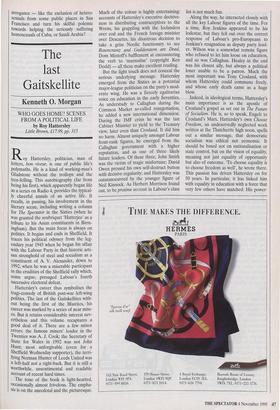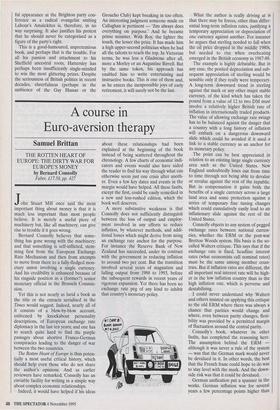The last Gaitskellite
Kenneth 0. Morgan
WHO GOES HOME? SCENES FROM A POLITICAL LIFE by Roy Hattersley
Little Brown, £1799, pp. 315
Roy Hattersley, politician, man of letters, bon viveur, is one of public life's polymaths. He is a kind of working-man's Gladstone without the trollops and the tree-felling. This autobiography (far from being his first), which apparently began life as a series on Radio 4, provides the typical- ly cheerful annals of an active life. It recalls, in passing, his involvement in the literary scene, including writing a column for The Spectator in the Sixties (when he was granted the soubriquet `Hatterjee' as a tribute to his Asian constituents in Birm- ingham). But the main focus is always on politics. It begins and ends in Sheffield. It traces his political odyssey from the leg- endary year 1945 when he began his affair with the Labour Party in that historic arti- san stronghold of steel and socialism as a constituent of A. V. Alexander, down to 1992, when he was a miserable participant in the crudities of the Sheffield rally which, some argue, presaged Labour's fourth successive electoral defeat.
Hattersley's career thus symbolises the tragi-comedy of British post-war left-wing politics. The last of the Gaitskellites with- out being the first of the Blairites, his career was marked by a series of near miss- es. But it retains considerable interest nev- ertheless and this volume recaptures a good deal of it. There are a few minor errors: the famous miners' leader in the Twenties was A. J. Cook; the Secretary of State for Wales in 1992 was not John Hunt; most unforgivable (even for a Sheffield Wednesday supporter), the terri- fying Norman Hunter of Leeds United was a left-half not a right-back. But it is still a worthwhile, unsentimental and readable account of recent hard times.
The tone of the book is light-hearted, occasionally almost frivolous. The empha- sis is on the anecdotal and the picturesque. Much of the colour is highly entertaining: accounts of Hattersley's executive decisive- ness in distributing contraceptives to the Wrens, his grappling with the Icelanders over cod and the French foreign minister over Descartes, his disastrous decision to take a grim Nordic functionary to see Rosencrantz and Guildenstem are Dead, Dom Mintoff's bafflement at encountering the verb to `marinalise' (copyright Ken Dodd) — all these make excellent reading. But the light touch does not conceal the serious underlying message. Hattersley emerged from the Sixties as a potential major-league politician on the party's mod- erate wing. He was a fiercely egalitarian voice on education in the early Seventies. As understudy to Callaghan during the Common Market so-called renegotiation, he added a new international dimension. During the IMF crisis he was the last Cabinet Minister to yield to the Treasury view, later even than Crosland. It did him no harm. Almost uniquely amongst Labour front-rank figures, he emerged from the Callaghan government with a higher reputation, and as one of three likely future leaders. Of these three, John Smith was the victim of tragic misfortune; David Owen pressed his own self-destruct button with decisive regularity; and Hattersley was outmanoeuvred by the younger figure of Neil Kinnock. As Herbert Morrison found out, to be proxime accessit in Labour's class list is not much fun.
Along the way, he interacted closely with all the key Labour figures of the time. For a time, Roy Jenkins appeared to be his lodestar, but they fell out over the correct response of Labour's pro-Europeans to Jenkins's resignation as deputy party lead- er. Wilson was a somewhat remote figure who refused to let him loose on education, and so was Callaghan. Healey in the end was his closest ally, but always a political loner unable to be a patron. Much the most important was Tony Crosland, with whom Hattersley could commune freely, and whose early death came as a huge blow.
Indeed, in ideological terms, Hattersley's main importance is as the apostle of Crosland's gospel as set out in The Future of Socialism. He is, so to speak, Engels to Crosland's Marx. Hattersley's own Choose Freedom, an undeservedly neglected work written at the Thatcherite high noon, spells out a similar message, that democratic socialism was ethical not economic. It should be based not on nationalisation or state control, but on the vision of equality, meaning not just equality of opportunity but also of outcome. 'To choose equality is to choose freedom as well', he wrote there. This passion has driven Hattersley on for 50 years. In particular, it has linked him with equality in education with a force that very few others have matched. His power- ful appearance at the Brighton party con- ference as a radical evangelist smiting Labour's Arnalekites is, therefore, in no way surprising. It also justifies his protest that he should never be categorised as a figure of the party's right.
This is a good-humoured, unpretentious book, and perhaps that is the trouble. For all his passion and attachment to his Sheffield ancestral roots, Hattersley has perhaps been insufficiently single-minded to win the most glittering prizes. Despite the seriousness of British politics in recent decades, cheerfulness (perhaps in the ambience of the Gay Hussar or the Groucho Club) kept breaking in too often. An interesting judgment someone made on Callaghan is pertinent — `Jim always does everything on purpose.' And he became prime minister. With Roy, the lighter the touch, the lesser the prize. It has made him a high upper-second politician when he had all the talents to reach the top. In Victorian terms, he was less a Gladstone after all, more a Morley or an Augustine Birrell. But by the same token, his approach has enabled him to write entertaining and instructive books. This is one of them and, as he enters the inexpressible joys of early retirement, it will surely not be the last.











































































 Previous page
Previous page